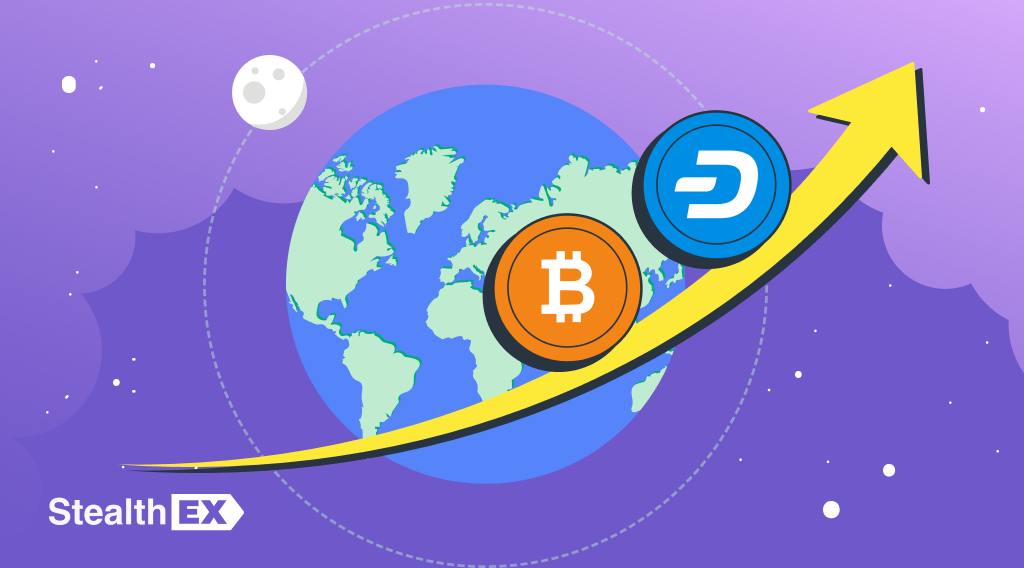Cryptocurrency Adoption and Use Cases

In the last decade, the financial world has witnessed an unprecedented phenomenon: the meteoric rise of cryptocurrencies. From being a niche topic discussed in tech forums to becoming a mainstream financial instrument, cryptocurrencies have revolutionized how we perceive and handle money. This digital form of currency, underpinned by blockchain technology, promises transparency, security, and decentralization, contributing to its growing allure.

Understanding the adoption of cryptocurrency is not just about recognizing its increasing popularity but delving deeper into its real-world applications. As digital currencies continue to gain traction, they are reshaping industries, from retail to real estate, offering innovative solutions and challenging traditional business models. The importance of this cannot be overstated. Grasping the nuances of cryptocurrency adoption provides insights into future economic trends, investment opportunities, and the evolving nature of trade and commerce.
The growth of cryptocurrency adoption is a testament to its potential. With increasing businesses accepting crypto payments and nations contemplating digital currencies, we stand at the cusp of a financial revolution. This article aims to shed light on the trajectory of cryptocurrency adoption and the myriad use cases driving its integration into the global economy.
Article contents [hide]
From Bitcoin’s Inception to Today’s Diverse Crypto Landscape
In 2009, the world was introduced to Bitcoin, the first decentralized cryptocurrency. Created by the enigmatic Satoshi Nakamoto, Bitcoin responded to the financial crises with a vision for a decentralized monetary system. Fast forward to today, the crypto landscape has expanded exponentially. From Ethereum’s smart contracts to Ripple’s cross-border payment solutions, the world of cryptocurrency has evolved into a vast ecosystem with thousands of distinct digital currencies.
Several factors have propelled the adoption of cryptocurrencies. Technological advancements, especially in blockchain technology, have ensured secure and transparent transactions. Economic factors like hyperinflation in certain countries have driven people to seek alternative assets like Bitcoin. Moreover, global events, including trade wars and pandemics, have highlighted the need for a more resilient and decentralized financial system. These combined forces have made cryptocurrencies more than just a speculative asset – they’re now seen as a viable alternative to traditional currencies.
Cryptocurrencies are now, of course, kind of digital gold or a medium of exchange, but not only. Their use cases span various sectors. They facilitate remittances, ensuring faster and cheaper cross-border transactions. In art, NFTs (Non-Fungible Tokens) have revolutionized ownership and provenance. Furthermore, decentralized finance (DeFi) platforms offer banking services, from loans to interest-bearing accounts, without intermediaries. These are just the tip of the iceberg, with many more applications being developed daily.
Digital Payments Offer Faster, Decentralized Transactions
The digital age has ushered in a new era of payments. Cryptocurrencies, with their decentralized nature, offer transactions that are faster and free from intermediaries like banks. This means reduced fees and instantaneous global transfers, making it a preferred choice for many, especially in regions with limited banking infrastructure.
Beyond their utility as a medium of exchange, cryptocurrencies have emerged as a new asset class. The volatility of the crypto markets, while posing risks, also presents lucrative opportunities for traders and investors. With 24/7 trading and a global reach, cryptocurrency markets have attracted retail and institutional investors eager to capitalize on its potential returns.
There are also DApss and smart contracts. DApps are applications that run on a blockchain, ensuring a single entity does not control them. This decentralization offers transparency and resistance to censorship. Paired with smart contracts, self-executing contracts with terms directly written into code, DApps are revolutionizing sectors from gaming to supply chain management.
One of the standout features of cryptocurrencies is their enhanced privacy and security. Unlike traditional online transactions that often require personal details, crypto transactions can be made with pseudonymity (or even anonymity in some cases). Furthermore, the decentralized nature of blockchain ensures that users have control over their data, reducing the risks of data breaches and unauthorized access.
What Is Dash, and How Does It Solve Other Blockchain Problems?
Dash, often referred to as “Digital Cash,” stands out in the crowded cryptocurrency space with its unique features and value propositions. Originating as a fork from Bitcoin in 2014, Dash coin was designed to address some of the perceived shortcomings of Bitcoin, particularly in speed, fees, and privacy. While many cryptocurrencies offer similar promises, Dash has implemented several distinctive features that set it apart.
One of Dash’s standout features is InstantSend. As the name suggests, InstantSend facilitates near-instant transactions, significantly improving over the sometimes lengthy confirmation times experienced with other cryptocurrencies. This speed is achieved through a unique consensus mechanism, allowing quick and efficient transfers, making Dash attractive for everyday transactions.
Security, a paramount concern in the world of digital currencies, is robustly addressed by Dash through its ChainLocks feature. ChainLocks protect the Dash network against 51% mining attacks, a potential vulnerability in many blockchain networks. By leveraging the power of its Masternode network, Dash ensures that once a transaction is confirmed, it’s permanent and can’t be reversed, adding an extra layer of security.
Privacy remains a cornerstone of the cryptocurrency ethos, and Dash is no exception. With its PrivateSend feature, Dash offers enhanced transaction privacy by allowing users to mix their transactions with others, making it difficult to trace the origin of funds. This ensures that users can maintain their financial privacy, a feature that’s becoming increasingly valuable in our data-driven world.
Masternodes play a pivotal role in the Dash network. Unlike traditional cryptocurrency networks that rely solely on miners, Dash incorporates Masternodes, powerful servers that participate in decision-making and perform critical tasks like facilitating InstantSend and PrivateSend transactions. Owners of Masternodes are incentivized through rewards, and they also get a say in the governance of the Dash network, ensuring that decisions are decentralized and reflect the interests of the community.
Beyond its technical features, Dash has made significant strides in real-world applications and partnerships. Recognizing the potential of Dash for remittances and everyday transactions, several merchants globally have started accepting Dash as a payment method. Additionally, Dash has formed partnerships with payment platforms and even traditional financial institutions, further integrating it into the broader financial ecosystem.
Looking ahead, the prospects of Dash in the crypto ecosystem appear promising. With its focus on user experience through fast transactions, low fees, and robust security and privacy features, Dash is well-positioned to appeal to crypto enthusiasts and the general public. As the world continues to recognize the potential of cryptocurrencies for global commerce, remittances, and beyond, Dash’s unique offerings could see it gaining even more traction and acceptance.
Challenges and Criticisms of Crypto Mainstream Adoption
As cryptocurrencies continue to evolve and present a transformative approach to finance, they also face many challenges in their quest for mainstream adoption.
One of the most significant challenges is regulatory uncertainty. As we said before, cryptocurrencies operate in a decentralized manner, often transcending national borders. This poses a problem for regulators ensuring financial stability and protecting consumers. Different countries have adopted varied stances, from outright bans to open embrace, leading to a fragmented regulatory landscape. This inconsistency can deter institutional investors and businesses from engaging with cryptocurrencies, fearing potential legal repercussions.
Technological barriers also play a role. While blockchain, the underlying technology of cryptocurrencies, is hailed for its security and transparency, it’s not without its limitations. Scalability remains a concern, with popular blockchains like Bitcoin sometimes facing congestion, leading to slower transaction times and higher fees. Solutions are in the works, but achieving scalability without compromising security is a delicate balance.
Public perception and understanding are crucial for any new technology’s adoption. Cryptocurrencies, with their complex underlying technology and volatile markets, can be daunting for the average person. Misconceptions abound, and high-profile hacks or fraudulent schemes associated with crypto platforms have sometimes painted a negative image, making some wary of venturing into the crypto space.
Financial infrastructure integration is another hurdle. For cryptocurrencies to gain widespread acceptance, they must seamlessly integrate with existing economic systems. This means compatibility with banking systems, payment gateways, and other financial tools that people use daily. While progress has been made, with crypto wallets and dedicated payment gateways emerging, there’s still a long way to go.
Lastly, the environmental impact of some cryptocurrencies, particularly those that use energy-intensive proof-of-work mechanisms, has come under scrutiny. As global consciousness shifts towards sustainability, the environmental footprint of cryptocurrencies could influence their adoption rates.
With the growing popularity of cryptocurrencies, marketing and advertising in this space have become pivotal for reaching broader audiences.
Conclusion
Cryptocurrencies stand out as a beacon of innovation and potential in the evolving finance sector. Dash, with its unique features and real-world applications, exemplifies the transformative power of digital currencies. From offering faster transactions to ensuring privacy and security, it showcases the myriad possibilities of cryptocurrencies. However, as with any nascent technology, challenges persist. Regulatory uncertainties, technological barriers, and public perceptions shape the journey of cryptocurrencies toward mainstream adoption. Yet, the promise they hold is undeniable.
Readers must stay informed and engaged as we stand at the cusp of a financial revolution. Digital currencies are vast, dynamic, and full of potential. By continuing to explore and understand it, we position ourselves to be part of a future where finance is more inclusive, transparent, and decentralized.
StealthEX is here to help you swap or buy any cryptocurrency, for example, DASH coin. You can do this privately and with no need to sign up for the service. StealthEX’s crypto collection has more than 1300 different coins and you can do wallet-to-wallet transfers instantly and problem-free.
Just go to StealthEX and follow these easy steps:
- Choose the pair and the amount you want to exchange. For instance, BTC to DASH.
- Press the “Start exchange” button.
- Provide the recipient address to transfer your crypto to.
- Process the transaction.
- Receive your crypto coins.
Don’t forget to follow StealthEX on Medium, Twitter, Telegram, YouTube, and Publish0x to stay updated about the latest news on StealthEX.io and the rest of the crypto world.
Please make sure to do your own research before buying any crypto. The views and opinions expressed in this article are solely those of the author.
Bitcoin Bitcoin adoption cryptocurrency cryptocurrency adoption DASHRecent Articles on Cryptocurrency
 Arbitrum Price Prediction: Is ARB Crypto a Good Investment?
Arbitrum Price Prediction: Is ARB Crypto a Good Investment?  PancakeSwap Price Prediction: Will CAKE Coin Hit $10?
PancakeSwap Price Prediction: Will CAKE Coin Hit $10? 
